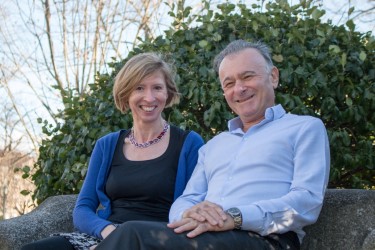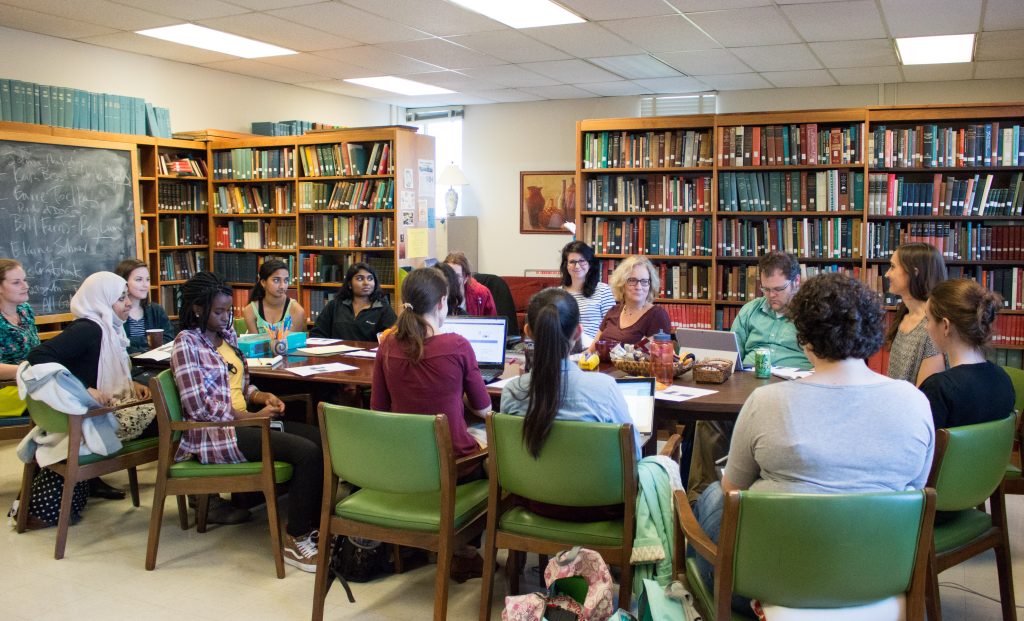
Faculty and students discuss health humanities projects in the HHIVE lab, founded by English professors Jane Thrailkill and Jordynn Jack. One project examined the impact that writing about diabetes had on the health of patients. (photo by Kristen Chavez)
If you hear the word “lab” and picture test tubes and autoclaves, the Health and Humanities: An Interdisciplinary Venue for Exploration lab will expand your horizons.
HHIVE (hhive.unc.edu), co-founded by English faculty members Jane Thrailkill and Jordynn Jack in spring 2015, provides undergraduate, graduate and professional students interested in health humanities the opportunity to participate in research and outreach projects at the intersection of the arts and sciences.
It is one of the first research-based health humanities labs in the country.
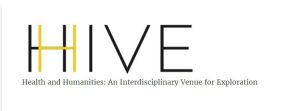 “HHIVE is devoted to the centrality of the human story and human expression and to living a meaningful, dignified and productive life,” said Thrailkill, co-director of the lab and of the English M.A. concentration in literature, medicine and culture. She is Bowman and Gordon Gray Distinguished Term Associate Professor of English.
“HHIVE is devoted to the centrality of the human story and human expression and to living a meaningful, dignified and productive life,” said Thrailkill, co-director of the lab and of the English M.A. concentration in literature, medicine and culture. She is Bowman and Gordon Gray Distinguished Term Associate Professor of English.
The Falls Narrative Study and the Writing Diabetes Study are the first two HHIVE lab projects, undertaken by interdisciplinary teams of faculty and students. Professor Sue Coppola in occupational therapy helped design the former study, in which 11 older adults were invited to write reflective, first-person accounts about a fall experience. Student researchers planned, conducted and analyzed these writing experiences in Thrailkill’s intensive research class. The narratives comprise a rich archive that provides insight into how older adults make meaning from a fall that they have experienced and the complex medical and social ramifications of a fall.
“Our goal is to learn as much as we can and to tell important stories with the end game always to expand human understanding and, if possible, palliate human suffering,” Thrailkill said.
Project coordinator Jen Stockwell, a Ph.D. candidate in English who led the workshop, said, “This wasn’t just about self-expression. We were hoping that the process of writing a narrative about their diabetes would be beneficial.” To that end, the researchers tracked the subjects’ blood sugar levels and compiled biometric data.
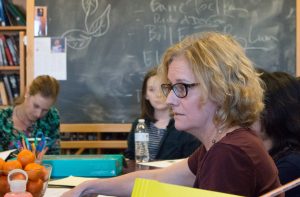
Sophomore Maebelle Mathew worked on the qualitative analysis of the diabetes narratives, using a software tool called Atlas TI.
“I looked at the keywords that popped up a lot related to tone and subject matter to see if the writing could be correlated with blood sugar levels,” Mathew said. “We looked at words that indicate positive social support and also looked at whether the participants felt in control of their diabetes and their life.”
UNC’s health humanities program continues to expand. Starting this fall, undergraduates will be able to complete a post-baccalaureate year to earn a master’s degree.
“This B.A./M.A. program will allow our really motivated and talented undergraduates to get a rich immersive year of study in health humanities that will help to shape their values, aspirations and goals as they go into clinical training,” Thrailkill said.
In addition, UNC’s medical campus is embracing the humanities.
“The UNC School of Medicine is revising its curriculum, with one of the significant additions being a strong arts and humanities component at every level,” said Thrailkill, who is completing a book, The Agony of Empathy in U.S. Medical Education.
The strong focus on written expression and analysis is helping medical students become communicators who are thoughtful and reflective and have the ability to be analytical about their experience, she said.
“They are not just doing what it takes to become doctors, they are thinking about the nature of what they are doing.”
By Michele Lynn
Read more stories about interdisciplinary mashups:
Helping students explore being Maya
Published in the Spring 2017 issue | Features
Read More
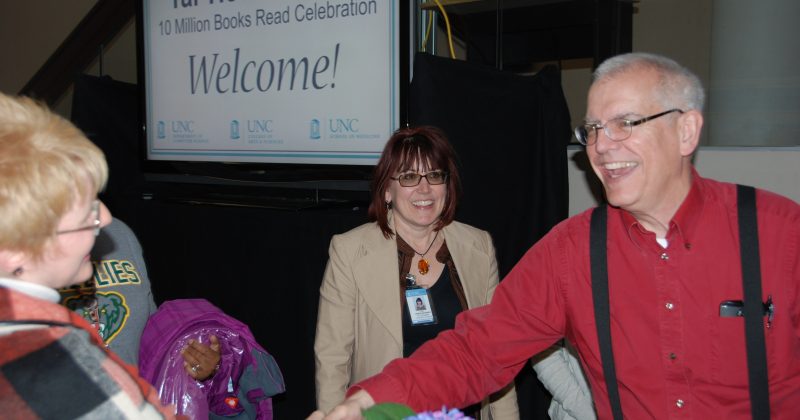
Tar Heel Reader reaches 10 million books read
Tar Heel Reader, an online program that helps students with…

UNC receives grant to develop videos to counteract extremists
An $867,000 grant to UNC will fund a project to…


